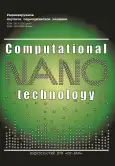Modeling Information Security Threats and Determination of Their Relevance for Information Systems of Informatization Objects of Federal Executive Authorities
- Authors: Zavodtsev I.V.1, Borisov M.A.1, Bondarenko N.N.1, Meleshko V.A.1
-
Affiliations:
- Lomonosov Moscow State University
- Issue: Vol 9, No 1 (2022)
- Pages: 106-114
- Section: Articles
- URL: https://journal-vniispk.ru/2313-223X/article/view/147112
- DOI: https://doi.org/10.33693/2313-223X-2022-9-1-106-114
- ID: 147112
Cite item
Abstract
Full Text
##article.viewOnOriginalSite##About the authors
Ilia V. Zavodtsev
Lomonosov Moscow State University
Email: nilrs@rambler.ru
Cand. Sci. (Eng.), Associate Professor; associate professor Moscow, Russian Federation
Mikhail A. Borisov
Lomonosov Moscow State University
Email: bma_mv@rambler.ru
associate professor Moscow, Russian Federation
Nikolai N. Bondarenko
Lomonosov Moscow State University
Email: bondarenkonn.corp@gmail.com
PhD student Moscow, Russian Federation
Vladimir A. Meleshko
Lomonosov Moscow State UniversityMoscow, Russian Federation
References
- Federal Law No. 149-FZ dated July 27, 2006 “On information, information technologies and information protection”. Collection of Legislation of the Russian Federation. 07.31.2006. No. 31 (part 1). Art. 3448. (In Rus.)
- Federal Law No. 248-FZ dated July 31, 2020 “On state control (supervision) and municipal control in the Russian Federation”. Collection of Legislation of the Russian Federation. 08.03.2020. No. 31 (part 1). Art. 5007. (In Rus.)
- Order of the FSTEC of Russia dated February 11, 2013 No. 17 “On approval of requirements for the protection of information that does not constitute a state secret contained in state information systems”. Rossiyskaya Gazeta. 06.26.2013. No. 136. (In Rus.)
- Order of the FSTEC of Russia dated March 14, 2014 No. 31 “On approval of the Requirements for ensuring the protection of information in automated control systems for production and technological processes at critically important facilities, potentially hazardous facilities, as well as facilities that pose an increased danger to human life and health and to the natural environment”. Rossiyskaya Gazeta. 08/06/2014. No. 175. (In Rus.)
- IT.SAVZ.B6.PZ. Methodical document. Protection profile of anti-virus protection type “B” of the sixth protection class (approved by the FSTEC of Russia on 14.06.2012). URL: https://fstec.ru
- Methodological document. Information protection measures in state information systems (approved by the FSTEC of Russia on February 11, 2014). URL: https://fstec.ru
- Methodological document. Methodology for assessing threats to information security (approved by the FSTEC of Russia on February 5, 2021). URL: https://fstec.ru
- GOST R ISO/IEC 15408-1-2012. National standard of the Russian Federation. Information technology. Methods and means of ensuring security. Criteria for evaluating information technology security. Part 1: Introduction and general model. Moscow: Standartinform, 2014.
- GOST R 58771-2019. National standard of the Russian Federation. Risk management. Risk assessment technologies (approved and put into effect by the Order of Rosstandart dated December 17, 2019 No. 1405-st). Moscow: Standartinform, 2020.
- GOST R ISO/IEC 27001-2021. National standard of the Russian Federation. Information technology. Methods and means of ensuring security. Information security management systems. Requirements (approved and put into effect by the Order of Rosstandart dated November 30, 2021 No. 1653-st). Moscow: Standartinform, 2022.
- Borisov M.A., Golod V.V., Osadchiy A.I., Trofimov V.V. Model of unauthorized access to information in dynamically changing conditions. Software Products and Systems. 2005. No. 4. Pp. 45-48. (In Rus.)
- Borisov M.A., Zavodtsev I.V. Vulnerability assessment tools in automated systems. Scientific Journal Vestnik RGGU. Series Informatics. Data Protection. Maths. 2010. No. 12 (55)/10. Pp. 259-262. (In Rus.)
- Doynikova E.V., Kotenko I.V. Methods and software component of risk assessment based on attack graphs for security information and event management systems. Information and Control Systems. 2016. No. 5. Pp. 56-67.
- Polyansky D.A. Security assessment: Textbook allowance. Vladimir: Publishing house Vladim. State Univ., 2005. 80 p.
- Shcheglov A.Yu. Mathematical models and methods of formal design of information systems protection systems: textbook. allowance. St. Petersburg: ITMO University, 2015. 93 p.
- The DFIR report. Real intrusions by real attackers, the truth behind the intrusion. URL: https://thedfirreport.com
Supplementary files








